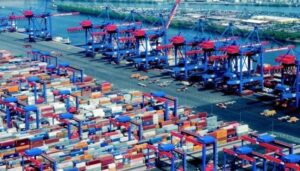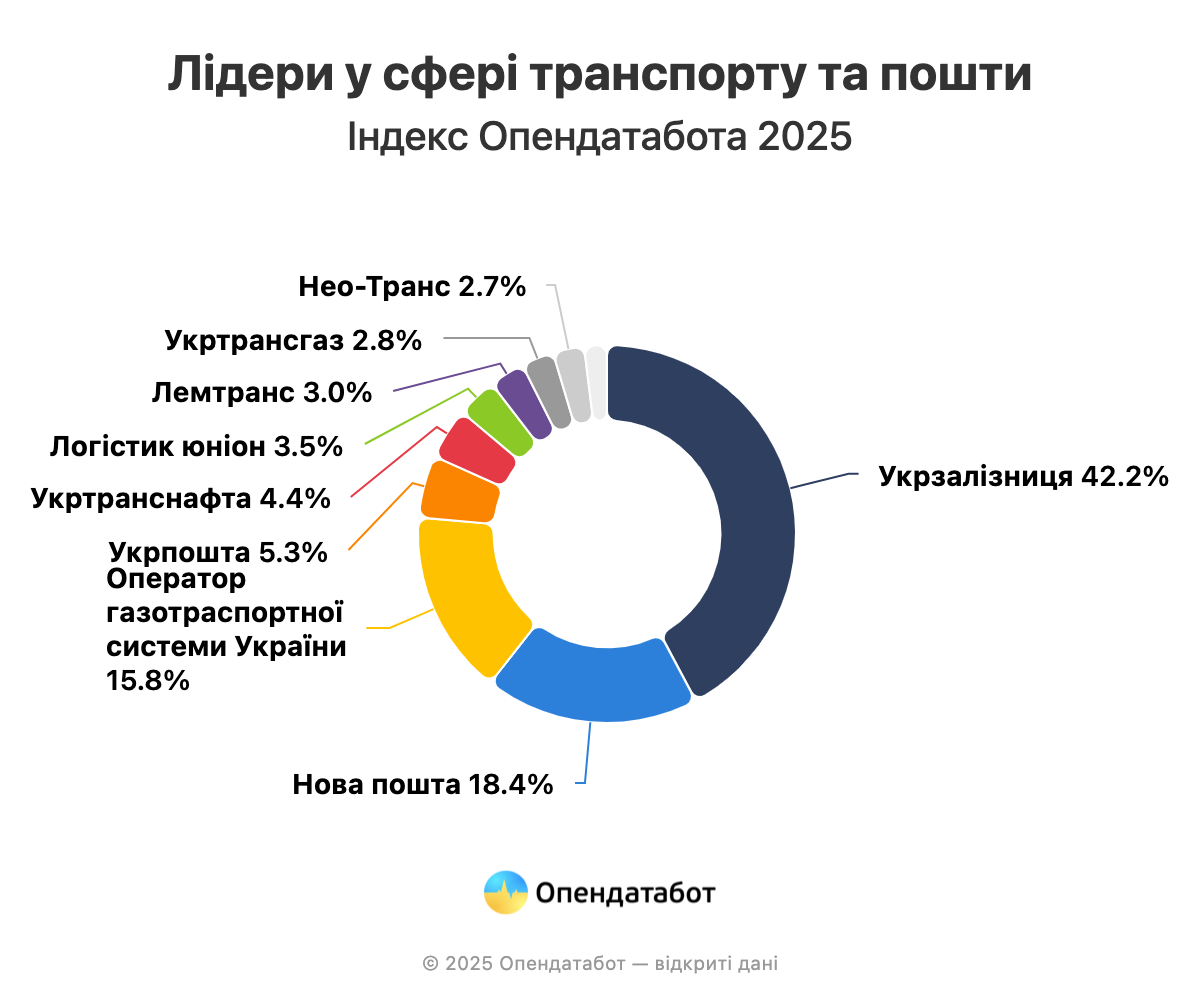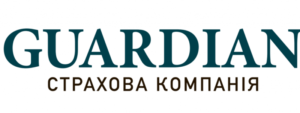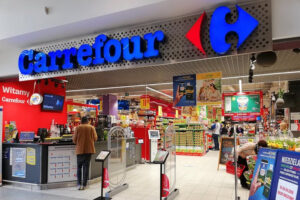
The total revenue of the top ten companies in this sector increased by 12%
According to the Opendatabot Index, the top ten companies in the transportation and logistics sector generated more than UAH 243 billion in total revenue last year. This is 12% more than in 2023. Only 5 out of 10 companies managed to make a profit that year.
According to the Opendatabot Index, the leading companies in the field of transport and postal services earned UAH 243.67 billion in revenue. Their total revenue grew by 12% over the year.
Not everyone had a good year: 8 companies saw their revenues grow, but only 5 of the top ten managed to make a net profit. The total profit of the top five was UAH 8.16 billion, while the losses of the other four companies amounted to UAH 12.1 billion. Another company broke even last year.
Despite the fact that half of the leading companies are state-owned, they account for more than 70% of the total income of the top five: UAH 171.89 billion.
Ukrzaliznytsia, the permanent leader of the Index, received UAH 102.87 billion in revenue last year (+11% yoy). However, the company still made a loss at the end of the year: UAH 4.19 billion. Ukrtransgaz had a similar situation: its revenue decreased by almost a third, and its losses reached UAH 7.44 billion.
Ukrposhta had a more successful year. Despite the fact that the company ended the year in the red, it managed to reduce its losses by almost 2 times. Overall, Ukrposhta increased its revenue by 12% to UAH 12.98 billion last year.
“For us, this rating and its results are not just numbers on the screen. These are years of hard work by tens of thousands of people who have been implementing reforms step by step and turning Ukrposhta into a modern and successful business. Despite the challenges of the war and the fact that we are a business with a human face, guided not only by short-term financial gain but also by the welfare of Ukrainians, we succeed,” comments Igor Smelyansky, CEO of Ukrposhta.
Another state-owned company, the Ukrainian Gas Transmission System Operator, increased its revenues by 7% to UAH 38.53 billion over the year. Although net profit decreased by 8.7 times to UAH 1.27 billion, the company still ended the year in the black.
“Ukraine’s GTS operator operates stably and reliably despite numerous challenges caused by the full-scale war. The company clearly and timely fulfills its obligations to internal and external customers of natural gas transportation services. This approach ensures the financial sustainability of the Company’s development,” said Vladislav Medvedev, acting CEO of GTSOU.
The revenue of the state-owned Ukrtransnafta decreased insignificantly, but its profit dropped by 16 times to UAH 1.22 billion. It is worth noting that in the previous Index, this company was the leader in terms of profit among the top ten.
For the second year in a row, Nova Poshta, which belongs to the NOVA group, has been ranked second in the Index, with its revenue up 23% to UAH 44.78 billion. But profit, on the contrary, decreased by 1.6 times to UAH 2.5 billion.
“In 2024, Nova Poshta became the world’s best postal operator according to the World Post & Parcel Award, expanding its network to more than 37,000 service points in Ukraine and more than 87,000 in 16 European countries by the end of the year. Last year, we opened the first barrier-free post office in Ukraine and donated more than UAH 4.8 billion for humanitarian needs and support of the army. 2024 was about movement and the challenges we managed to overcome,” the company commented.
This year, another NOVA Group company, Neo-Trans, was included in the Index for the first time. It showed the fastest revenue growth among the top ten: +100% (UAH 6.5 billion). Its profit also doubled to UAH 116.55 million. Together, the two NOVA companies account for 21% of the total revenue of the leaders.
Logistician Union of the ATB group is not far behind. Thus, the company moved up several positions in the ranking, increasing its revenue by 29% and earning the largest profit of all – UAH 3.06 billion (+40%).
Lemtrans, a company of Akhmetov’s SCM Group, demonstrates stability and remains in the seventh position for the third year in a row. Its revenue increased by only 3% to UAH 7.3 billion.
This year’s Index includes another new company, Ukrainian Helicopters. Despite a 17% increase in revenue (up to UAH 872 million), which allowed it to break into the top, the business recorded a loss of UAH 52.5 million.
At the same time, two companies from Oleksandr Radavsky’s agricultural holding, Promvagontrans and Berehove Grain Receiving Enterprise, dropped out of the 2025 Index. In 2024, their revenues decreased by 2.5 and 3 times, respectively, but both of them turned a profit: +UAH 2 million and +UAH 36 million in profit.
https://opendatabot.ua/analytics/index-transport-and-mail-2025


On April 17, the Patrol Police Department announced its intention to conclude with IC “Guardian” (Kiev) a contract of compulsory insurance of civil liability of owners of land vehicles (MTPL) for 1,585 units.
As reported in the system of electronic public procurement Prozorro, the company’s price offer amounted to UAH 8.147 million against the expected cost of purchasing services of UAH 8.384 million.
The company was the only bidder.
IC “Guardian” is a member of the Presidium of the League of Insurance Organizations of Ukraine. Since January 2020 it has received the status of a full member of the ITSBU, has the right to sell “Green Card” policies.
In October, 2020 by the decision of the general meeting of members of the Nuclear Insurance Pool of Ukraine IC “Guardian” became its member.
IC Guardian, INSURANCE, Motor transport, MTPL insurance, Patrol police

The Fozzy Group, together with Polish manager Maciej Gawronski, has established a joint venture company IDKFA IDCLIP in Poland, 90% of which is owned by Fozzy Holdings Limited and 10% by Gawronski, and became a franchisee of the Carrefour retail chain, the Polish edition of Wiadomosci Handlowe reports.
It is noted that the first store of the chain has already been opened in Poznan.
“While researching the Polish market, we found that Polish retail experts were interested in Silpo’s unique value proposition. We have established excellent cooperation, for example, with Polish breweries, farmers and chefs. It was therefore useful to share our experience and explore some common development opportunities,” the retail chain’s press service told the Polish publication.
At the same time, she explained that many Ukrainians have found refuge in EU countries, particularly in Poland, and when they return, their expectations of a grocery store may change. Therefore, Silpo needs to evolve to offer the best service regardless of the war.
According to Gavronsky, the Ukrainian company in this project is mainly a financial investor, so this is not a full-fledged entry of Fozzy Group into the Polish market under its own brand.
Gawronski has extensive experience in retail – he has worked for Jeronimo Martins for over 20 years, including work at Biedronka (one of the largest grocery chains in Poland). Since 2017, he has been working as Head of Logistics and Supply Chain at Fozzy Group.
Fozzy Group is owned by Volodymyr Kostelman, who founded the company in 1997 in Kyiv. Fozzy Group currently owns the second largest supermarket chain in Ukraine after ATB-Market.
As early as March 2023, Silpo expressed interest in the Polish market and was looking for locations for stores with an area of 2500-5000 square meters. According to unofficial information, the company is still considering opening its own Silpo stores in Poland and continues to look for optimal locations.
Fozzy Group is one of Ukraine’s largest retailers with more than 690 outlets across the country. The company develops retail chains of various formats: Silpo supermarkets, Fozzy Cash&Carry wholesale hypermarkets, Fora convenience stores, Thrash! discounters, and Bila Romashka pharmaceutical supermarkets.
The Fozzy Group’s business is not limited to trade. The group owns restaurants (Boulangerie, Escobar, Positano, Who&Why Drinkery), an agro-industrial business (Nizhyn, Greenville, Sniatynska Prytya, Bohuslavna, Skadi), Vostok Bank, Silpo Voyage travel agency chain, Apollo Next sports club chain, UVK logistics operator, and TemaBit Fozzy Group, an IT developer.

Metinvest Mining and Metallurgical Company has promptly adapted its production processes to the war conditions, making railways and ports in Romania and Poland the main transportation channels, Metinvest Group CEO Yuriy Ryzhenkov said as quoted by a corporate publication.
He added that after the opening of the sea corridor from Odesa ports, the company began to use this opportunity as well.
Ryzhenkov emphasized that despite the challenges of the war, Metinvest has the status of the largest exporter. Thus, in 2024, the total volume of exports and sales of iron ore raw materials amounted to more than 12 million tons.
“We have fully returned to our operational efficiency improvement program. For example, we have reconfigured business processes to use our own raw materials. And by most indicators – namely technical, technological and production – we have returned to the best results of 2020-2021. We have significantly reduced production costs, and despite the fall in prices in 2024, our results for the first half of the year exceeded those of the first half of 2023,” Ryzhenkov stated.
Today, the company’s assets in Kryvyi Rih, Zaporizhzhia and Kamianske continue to operate. In 2024, the group’s production increased in several categories: iron ore by 42%, pig iron by 3%, and steel by 4%.
At the same time, it is emphasized that Metinvest remains a socially responsible business. Over the three years of the war, the company has allocated more than UAH 8.4 billion to help Ukraine, of which UAH 4.4 billion went to support the defenders of Ukraine under the Steel Front project. The main areas of focus include providing the army with equipment, ammunition and machinery, developing tactical medicine and creating defense lines.
In addition to military needs, Metinvest is involved in supporting humanitarian missions, helping hundreds of thousands of Ukrainians affected by the war. About 516,000 civilians have already received support under the Saving Lives initiative. With more than 50,000 active employees, the company ensures decent working conditions and takes care of its employees and their families, providing financial, psychological and other assistance as needed. The company employs more than 1,000 veterans, and it also implements programs for their adaptation to civilian life.
It is noted that last year Metinvest paid almost UAH 20 billion in taxes, making it one of the largest taxpayers in the country.
A separate emphasis is placed on the prospect of post-war recovery. The CEO outlined the company’s main ambition as turning it into one of the world’s leaders in green steel production that meets modern environmental standards. The first step towards this goal is the construction of a green steel plant in Italy. The project will serve as an example for the future modernization of Zaporizhstal and Kametstal.
“We have an $8 billion strategy for the green modernization of Ukrainian enterprises for 7-10 years. We are ready to launch this strategy as soon as the war is over and Ukraine receives security guarantees,” Ryzhenkov said.
Despite the war, Metinvest continues to invest in Ukrainian facilities: in 2024, the total investment reached $670 million. In 2025, the company also plans to invest billions of dollars in the development of production facilities in Kryvyi Rih, Kamianske and Zaporizhzhia.
At the same time, the group is actively preparing for Ukraine’s large-scale recovery after the war. The Group plans to participate in large infrastructure and industrial projects that will not only help rebuild destroyed housing and social infrastructure but also ensure their modernization.
“Metinvest is a vertically integrated group of steel and mining companies. Its enterprises are located in Ukraine – in Donetsk, Luhansk, Zaporizhzhia and Dnipro regions, as well as in Europe and the United States.
The main shareholders of the holding are SCM Group (71.24%) and Smart Holding (23.76%), which jointly manage it. Metinvest Holding LLC is the management company of Metinvest Group.

Ukraine reduced imports of nickel and nickel products by 49.3% to $3.9 million in January-March 2025.
In March, imports amounted to $1.92 million.
Exports of nickel products tripled to $361 thousand compared to $94 thousand last year, including $328 thousand in March.
In 2024, imports increased by 73.7% to $26.73 million, while exports rose to $602 thousand (+13%).
Nickel is used in the production of stainless steel and for nickel plating. Nickel is also used in the production of batteries, powder metallurgy, and chemicals.

The Ministry of Agrarian Policy and Food, together with the international company Bayer and the All-Ukrainian Association of Communities, has launched a seed program that will provide free corn seeds for the spring sowing season to farmers in Donetsk, Zaporizhzhia, Sumy, Kharkiv and Chernihiv regions (excluding the temporarily occupied territories).
“This initiative is another step towards strengthening Ukraine’s food security in times of war, as it will allow farmers from the frontline and de-occupied territories to sow approximately 10 thousand hectares and harvest approximately 120 thousand tons of grain,” the Ministry of Agrarian Policy emphasized.
According to the ministry, to receive assistance, a farm must be registered in the State Agrarian Register (SAR) and cultivate from 5 hectares to 500 hectares in the specified areas.
Applications will be accepted from April 21 to April 30 or until the amount of assistance is exhausted. Each approved applicant will be able to receive up to 25 sowing units of corn seeds (1 sowing unit per 1 ha) depending on the area of land under cultivation. Seed distribution will begin in early May and will last approximately two weeks.